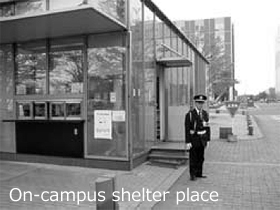1. Police, Fire Department and Ambulance
Dial the following numbers to call police, the fire department or an ambulance.
No area code is necessary. Fixed-line telephones, cell phones and pay phones will reach the closest dispatcher.
Making an emergency call in Japanese
The 110 or 119 dispatcher will ask questions such as "Was there an accident (jiko desuka)?" "Was there an incident (jiken desuka)?" "Do you need an ambulance (kyukyusha wo yobimasuka)?" and "What is the address (juusho wa)?" The caller will be required to explain the situation.
2. When Accidents or Disasters Occur

If an accident occurs on campus, first contact the relevant head office. At home, preparation should be made for earthquakes, floods or other disasters by purchasing an emergency kit sold at home improvement centers. A typical kit consists of supplies such as emergency food, a radio, a flashlight, rope, a whistle and a makeshift toilet. In the event a severe earthquake occurs, evacuate to a nearby shelter designated by the community.
In many cases the designated shelter is a local elementary or junior high school, so their locations should be confirmed in advance.
If an earthquake occurs
Earthquakes occur frequently in Japan. Most of the earthquakes are small and you may not feel any. Even what may feel like a severe tremor usually subsides after a few minutes.
If a tremor is felt, secure physical safety. Move away from furniture and other objects that may fall over easily, and get underneath a desk or table. Extinguish cooking or heating equipment flames after the initial tremor subsides somewhat.
Typhoon
Typhoons occur sometimes in Japan between July and September. Strong winds and heavy rain can cause damage such as landslides or floods. If a typhoon comes, firmly shut apartment windows and sliding shutters.
Fire
Japanese houses are often made of wood. Fires can easily start during dry seasons such as winter, so thorough care should be taken to extinguish all flames before going to bed or going out. If a fire occurs, shout "Fire (kaji da)!" to let others know, then call 119 and give the location to the dispatcher.






